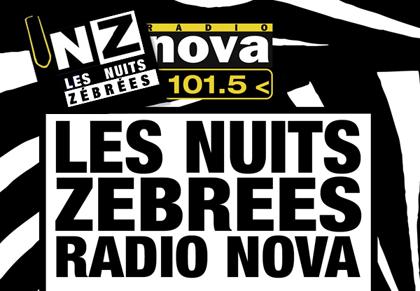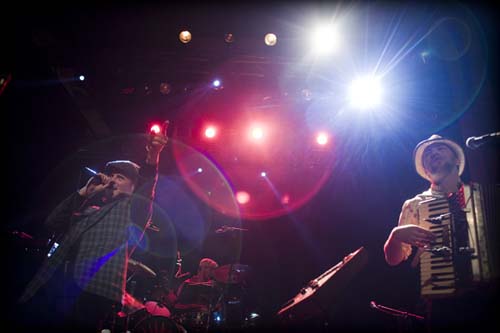Last Friday night your correspondent was at Les Nuits Zebrées, an invitation-only concert at La Bellevilloise hosted (and broadcast live) by hip Paris station Radio Nova.
 Our interest was in Tony Allen, not just because of his connection to the legendary Fela Kuti but because his was the only name on the line-up that we recognized. Still, we were assured that the other acts would be just as good, so along we went in curiosity.
Our interest was in Tony Allen, not just because of his connection to the legendary Fela Kuti but because his was the only name on the line-up that we recognized. Still, we were assured that the other acts would be just as good, so along we went in curiosity.
And the intrigue was heightened when we saw that Allen wasn’t even top of the bill, but would be on and off by 10:15 that night. Who were these people unknown to us, Oxmo Puccino and Java, headlining and filling this concert while relegating an international cult hero to a supporting role? We’ll come to them later.
First, Tony Allen, his shiny shellsuit and his 8-piece band. No sooner had he settled into his seat than he uttered the dreaded words: “Tonight we’ll be playing only new songs, no older stuff…” New songs meant safe-hands Afrobeat with support-group lyrics about celebrating everyday and living life to the max.
The group’s guitarist kept to fairly basic chicken-scratching all night, which probably accounted for his slightly demented expression: one could see that here was a man who would sooner have been celebrating savage riffs and sexy licks. Still, like reggae, Afrobeat is hard to get wrong – so long as the band is tight and the words not too distractingly naff, it’ll always get you moving.
We caught the last few numbers of Oxmo Puccino: he’s a Mali-born rapper, real name Abdoulaye Diarra. Unlike his more muscular French counterparts and their concrete-block beats, he raps along to melodic music and supple rhythms. It was impressive and likeable stuff. Oxmo Puccino will be at the Solidays festival here in Paris next weekend – as will your correspondent, and we’ll make sure to catch him again.
But what about this Java, then? Digging desperately for scraps of pre-gig info, we were told that their brand of rap + rock + trad French had filled the 1,200-punter Elysée Montmartre the previous week, so they were clearly big in France. This was news to us. All this time the room had filled to bursting. The excitement was palpable and the heat was intense: condensed sweat dripped from the low ceiling. Then on stroll Java, four thirtysomething Parisians dressed by the houses of punk and ska.
 You can see how Java (left) have generated such a large live following. Their hip-hop beats get people jumping and the stiff, strident rapping of R.Wan whips them into a frenzy. Where punk bands have a guitar, Java have a very French-sounding musette accordion – this gives them an air of home-grown authenticity but also a slightly conservative familiarity which calls like a siren to the mainstream Gallic punter. Musically, there isn’t anything radically new here – modern chanson française already prizes monotone/spoken lyrics, retro instruments and the rhythms of rap and electronica.
You can see how Java (left) have generated such a large live following. Their hip-hop beats get people jumping and the stiff, strident rapping of R.Wan whips them into a frenzy. Where punk bands have a guitar, Java have a very French-sounding musette accordion – this gives them an air of home-grown authenticity but also a slightly conservative familiarity which calls like a siren to the mainstream Gallic punter. Musically, there isn’t anything radically new here – modern chanson française already prizes monotone/spoken lyrics, retro instruments and the rhythms of rap and electronica.
That said, Java are hugely enjoyable live. They have in abundance what most hip-hop or French acts sorely lack – a sense of humour. They sum up their philosophy: “Java, c’est du rock n’roll… sex, accordeon et alcool” (sex, accordion and alcohol). A new song calling for ecumenical unity was potentially pompous, but its wit was underlined by R.Wan dressed as the Pope.
And on ‘J’Me Marre’ he touches on that most painful of French sporting heartaches: Seville ’82. (Believe us: regardless of 1998, French people have still not gotten over Schumacher and that penalty shoot-out.)
Most boho French acts (and Java are certainly bourgeois bohemians, or at least heavily dependent on that demographic) make a big deal of singing right-on lyrics with crowdpleasing digs at Sarko and ‘the fascists’. Java are more subtle and less superficial than that: R.Wan prods the ruling conservative mentality by succinctly observing how Paris is petrifying into an open-air museum (‘Paris Musée’) and how today’s working classes could soon change their sympathies from the Communist Party to the right-wing Front National (‘Mona’).
We’ve been listening to Java’s new album, ‘Maudits Français’ – the title is a play on “cursed French” and “badly-said French”. Quite simply, the live energy isn’t there – the beats are lower in the mix, so the swirling retro accordion dominates and gives a rather quaint feeling to the whole thing.
Still and all, Java are worth listening to if at least to find out what’s popular in France today - check out some of their tunes on Java's MySpace page. Here they are live with their manifesto, ‘Sex, Accordeon Et Alcool’:
More ...
[Read more...]